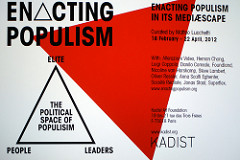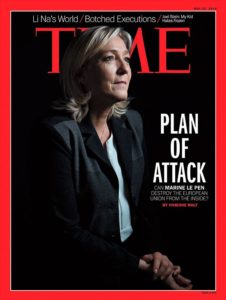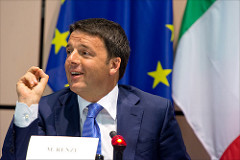This certainly has been a year of stunning election upsets. Everyone around the world knows about Brexit and last month’s American results. And other shocks could be just around the corner.
Populism Credited
Business Insider remarked in its article, “France is the next big vote to watch” on 11th of November 2016.
“Defying the odds, vocal populists have won the two major popular votes in the western world this year. The success … raises an obvious question: could it happen elsewhere in Europe?”

A Populism Symposium Ad
Populism, just what is it? A term made popular more than a century ago, it’s been revived to sum up the recent mood shift in the Western world.
The word is meant to convey the idea that — in unsettling times, individuals running for office seek to tap into the ordinary man’s deepest fears. Voters are led to believe that no one except a particular candidate, especially not any currently in power, truly gets what’s wrong and can make life better again for the little guy.
If an individual running for office has little or no political experience, it’s often seen as a plus.
It’s a tool that has been successfully employed by candidates from both the right and the left. Those in the middle are usually the big losers in this kind of political climate.
Thanks to the widespread revival of populism along with other factors, it’s highly possible that soon the West, including the future of the EU, is going to look very different.
The elections are worth watching to see just how dramatic and swift the change could be.
France
 On Sunday the 27th of November, the 2nd and final round of the French Republicans Presidential primary took place. François Fillon, called the “dark horse” by DW TV, won; so he will be the Conservatives candidate.
On Sunday the 27th of November, the 2nd and final round of the French Republicans Presidential primary took place. François Fillon, called the “dark horse” by DW TV, won; so he will be the Conservatives candidate.
In “Europhiles worried by Fillon’s lead …” dated the 22ndof November 2016, EurActive.com quoted Fillon’s remarks about the EU,
“We will never be one federal state. We are just too different. And, incidentally, it would be a historic mistake, because closer ties between states breed more aggressive nationalism.”
The primary rounds for the Socialists, or Liberals, are scheduled for the end of January.
Another candidate representing the far right, Marine Le Pen, is expected to run as well.
 “After Trump Win, Parallel Path Is Seen for Marine Le Pen …”, The NY Times wrote about her chances,
“After Trump Win, Parallel Path Is Seen for Marine Le Pen …”, The NY Times wrote about her chances,
“Before Donald J. Trump’s presidential victory in the United States … Ms. Le Pen was considered a disruptive political force but far from a true threat to become president herself when France votes next spring. Not anymore.”
If she becomes president, Le Pen promises to schedule a referendum on whether France should remain in the EU. So UK’s ‘Brexit’ could be followed by France’s ‘Frexit’.
The race for president will be wrapped up by the 7th of May.
Next, Austria and Italy
The Austrians and the Italians go to the polls this Sunday, the 4th of December.
On the 28th of September, The Economist magazine remarked in, “Why is Italy’s constitutional referendum important?”,
“The outcome will be crucial for the prime minister, Matteo Renzi … who said earlier this year he would resign if the vote went against him”.
 Italy’s prime minister wants to drastically reduce the size of the parliament now roughly double the size of the American congress. But seen as more controversial is the idea of changing a senator from being an elected position to a presidential appointment. The Guardian newspaper said,
Italy’s prime minister wants to drastically reduce the size of the parliament now roughly double the size of the American congress. But seen as more controversial is the idea of changing a senator from being an elected position to a presidential appointment. The Guardian newspaper said,
“Opponents of the reforms span the political spectrum, aligning political opponents on the far right and many on the left, including within Renzi’s own party, who have said the change will dangerously weaken Italy’s system of checks and balances.”
The “populist” anti-establishment party headed by Beppe Grillo and leading the No campaign is called the Five-Star (M5S).
In the Austrian presidential election held earlier in 2016, the vote between an Independent and a far-right candidate was considered so close that a rerun was rescheduled. To learn more, you can read our article,” July 28, 2016 – Austrian 2016 Elections Round 3 “.
2017
Several other key elections are on Europe’s 2017 calendar. Germany, for one, will vote on who will be its chancellor.
Photo Credits: Populism Ad by Marc Wathieu, License: CC BY-NC 2.0; Fillion courtesy of DNA Newspaper; Ms. Le Pen cover courtesy of Time Magazine; PM Renzi courtesy of European Parliament, License: CC BY-NC-ND 2.0